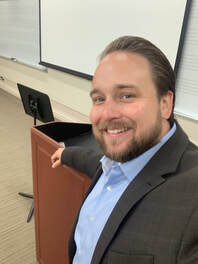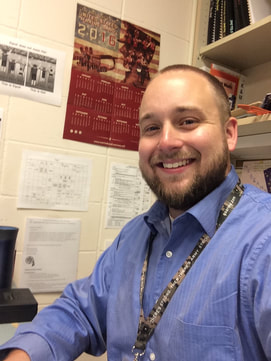Current PositionGraceland University
Director of Bands, Assistant Professor of Music |
With nearly 15 years of public school and collegiate teaching experience Brandt has taught band at all levels in Minnesota, South Dakota and Iowa. His bands have consistently earned superior ratings at large group contest, and have been selected to perform at the Minnesota Music Educators conference. While teaching at Brainerd High School the music department was honored to be named a Grammy Signature School semi-finalist.
Courses TaughtMUSC1700/3190 Symphonic Band
MUSC1600/3180 Jazz Ensemble MUSC1730/3120 Yellowjacket Marching Band MUSC1800/3130 Chamber Ensembles: Saxophone Ensemble MUSC1150 Music Theory I MUSC1160 Music Theory II MUSC2150 Music Theory III MUSC2160 Music Theory IV MUSC2150 Fundamental Musicianship III MUSC1670/3670 Applied Woodwinds MUSC1120 Introduction to Music Technology MUSC2340 Advanced Instrumental Conducting MUSC3290 Woodwind Methods and Pedagogy MUSC3310 Brass Methods and Pedagogy MUSC3360 Music in the Secondary School |
Adjudicator |
Brandt is routinely invited to adjudicate local and statewide instrumental large group contest, solo and ensemble contests, and marching band competitions in North Dakota, South Dakota, Minnesota and Nebraska. Now living in the Lincoln, NE area, Brandt has registered with the Nebraska Schools Activities Association as an Adjudicator.
|
Clinician |
Over the past several years Brandt has been invited to work with several bands from middle school to high school in Nebraska, Minnesota, North Dakota and South Dakota. Such clinics work best live, but can also be done via Skype/Facetime. On one occasion the band did not have consistent access to the internet to Skype so the director recorded a video of their performance, sent a link, and I provided a video response for the students to watch.
|
Lessons |
Private lessons are one of the best ways to advance on your instrument. Whether you are preparing for All-State, Solo/Ensemble contest, or just want to get better, lesson are the way to go. With instruction tailored to your individual needs you will be amazed at the progress you make.
|
Marching |
In his years working with high school bands Brandt directed with both competitive, and non-competitive marching bands. Growing up in a strong program that earned spots in Bands of America Super Regional finals, and completing student teaching in Carmel, IN with Richard Saucedo, Brandt has worked with some of the very best in the Marching Arts. Brandt is available as a technician in Visual, Woodwind, or Brass. Spending 6 years as Drum Major of the 451st Army Band, and attending and assisting in leadership and drum major seminars, Brandt is also available to work with band leadership.
|
Philosophy of Education |
As educators, we are bestowed with the awesome responsibility of molding subsequent generations. This staggering undertaking must be done with great intention and care. First and foremost, students must be made to feel safe, welcome, and free to experiment and expand their knowledge and limitations. It is no small request to nudge someone beyond what they believe their abilities are, and a person will only do so, will only attempt, and take risks, if they know they are safe. This, of course, does not mean that an educator should catch them every time they fall as failure breeds innovation, but rather to allow them to fail in a way that allows them to learn, and encourages them to try again. This type of risk-taking is most prevalent in a professional, trusting, and inclusive environments, built on a shared goal of betterment of all.
Our scope of student development expands well beyond our individual discipline. We must strive to develop the whole individual, to foster not just subject mastery, but rather a way of viewing the world, of questioning, analyzing, being curious, and creating unique solutions to existing challenges. Striving to meet the student at their current level of understanding and building from there, creating incremental gaps, allowing the student the opportunity to creating connections rather than simply being fed information is essential. Students must take ownership of their education, as it is a partnership and an agreement entered into by both student and teacher, and an agreement of shared responsibility. While a teacher may present the door to knowledge, and at times even open it, it is the student who must walk through, or breakthrough, that door. Struggle is necessary in learning. The more a student struggles to leap a hurdle or solve a problem, the deeper the anchor of the new connections made will be. One of the most challenging aspects of education is knowing how close or far a student is from that breakthrough, how much help they need to get there, and giving them just enough and no more. It can be tempting to walk the path for them, leaving bread crumbs every few feet. We have been there and seen the pitfalls; we know the path for safe passage. However, we must refrain. Every hurdle we leap for them is one less they have leapt in our safe environment, and is one less bit of experience they will have to draw upon once they leave our classroom. That must be the end goal of education - to prepare our students to face a changing world, and prepare them to fall. The most useful experience we can give our students is that of failing, and using that failure as a springboard to success. Resilience, like any skill, takes time to acquire. Our classrooms should act as a laboratory for trying, failing, and getting back up. Here is where music makes one of its most important, if lesser recognized, contributions to education. Music is hard, it can not simply be read about, understood, and mastered. It must be experienced. And for all (save a very few), this experience will include failure, but it also includes many small victories and triumphs which help establish self- worth. It establishes a sense of pride and connection with something larger than oneself, both of which helps to lift someone once they have fallen. These skills and attributes, acquired in a controlled environment, prepare our students for the inevitable day when they leave our classroom and must continue their journey on their own. |
Diversity Statement |
Music is often referred to as the universal language, and as effective as it can be at bridging divides and demolishing walls there is still considerable progress to be had. All discussion of diversity must begin with a simple and shared truth, that all human beings have worth, are equal, and should have access to the same opportunities. Throughout time more turmoil has resulted from our difference even though they are dwarfed by our commonalities. Furthermore, these differences add contrast, differing perspectives, and a richness to life and every organization smart enough to embrace them. To address the issue of diversity one must invite all members to the table, as equals and colleagues. It has been said that “people are hard to hate up close”, we must bring all of our brothers and sisters into the fold, close enough to see the humanity in them and to respond with compassion.
The challenges of diversity inclusion have resulted in the underrepresentation of several sections of our society. Many schools or departments provide inaccurate representations of the communities they represent. Organizations must enact specific and intentional strategies to increase the representation of those currently missing or minimized in our organizations. Music ensembles can present a unique, and visceral representation of how all members of society, of all colors, creeds, orientations etc. can unify to achieve a common goal. Furthermore, the interactions created by such endeavors inevitably force all parties to view the humanity in all members of the organization and allow individuals to truly see the individual beyond the label. Additionally, in the context of music one must embrace the power of positive representation with regard to programing music and selecting featured artists. One can not over state the impact that representation can have on historically marginalized persons to see works written by someone like them, or to be guest conducted by someone like them, or to feature a guest artist that looks like them. Diversity and inclusion is challenging but vital for any organization to endure the 21st century. Higher education in particular must embrace diversity, create a welcoming and inclusive environment for all students to achieve |


